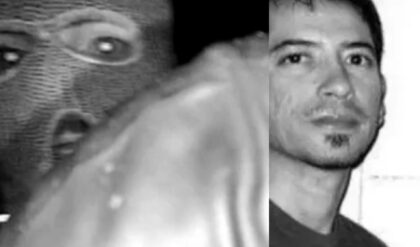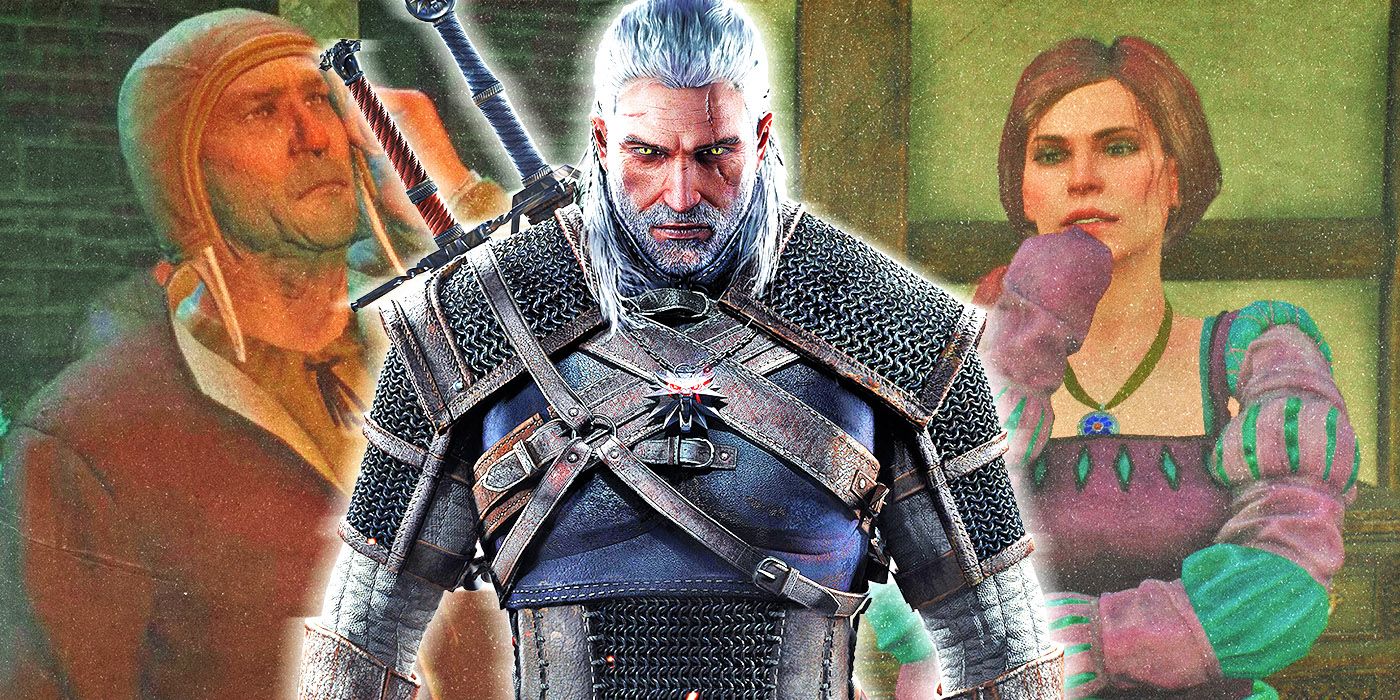
The nonstop action draws many gamers to Wild Hunt, so much so that when the game slows down, some players immediately lose interest. This makes “The Play’s the Thing” one of the most divisive main quests in the game because it pulls players out of the intense combat and exploration of Witcher 3’s open-world map and into a more cerebral part of the game. While many gamers criticize this quest, it’s a necessary point in the narrative where players can catch their breath.
“The Play’s the Thing” Quest, Explained
Completing ‘Count Reuven’s Treasure’ And ‘Get Junior’ Will Trigger It
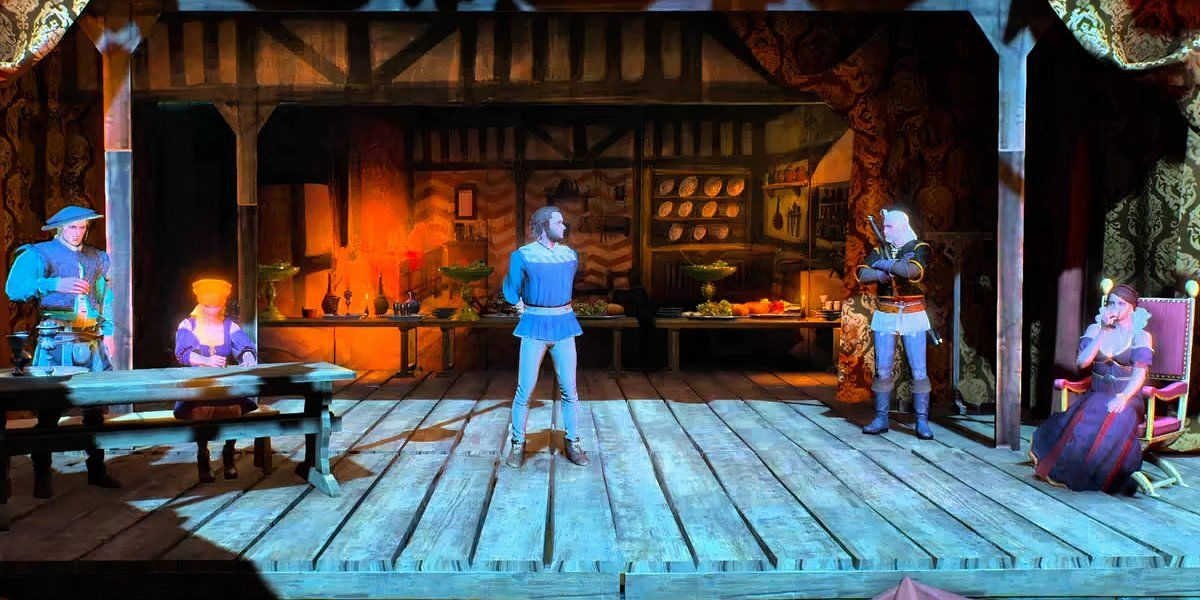
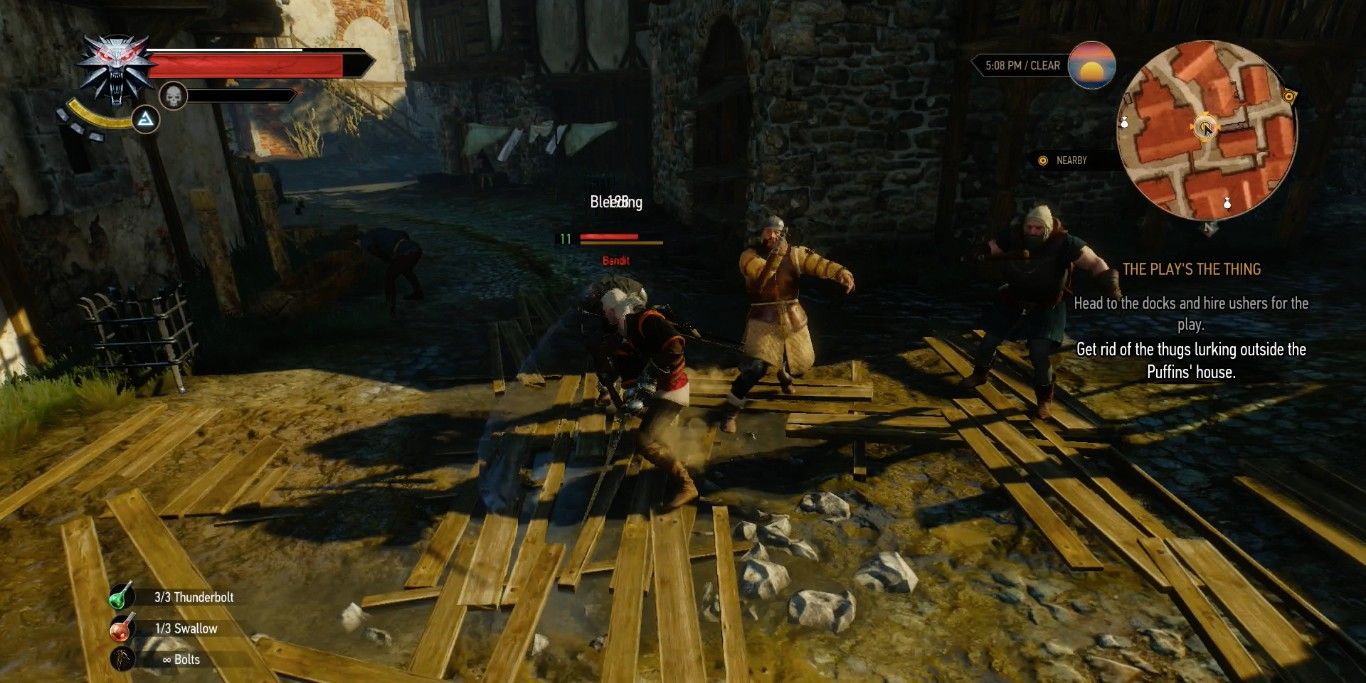
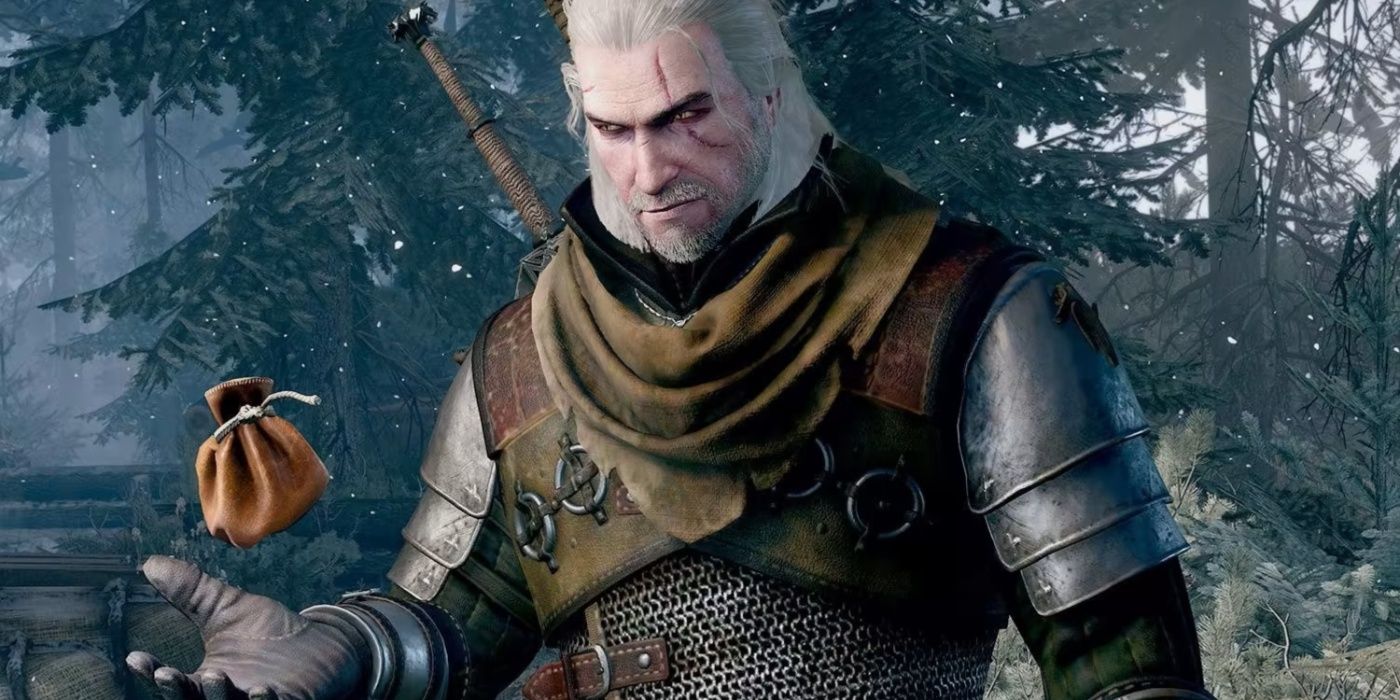





After completing both the “Count Reuven’s Treasure” and “Get Junior” quests, Geralt realizes he needs to find Dudu to help rescue Dandelion. Dudu, however, is a doppler, a shapeshifter that can mimic any living being he comes in contact with. That makes him extremely difficult to find. Dudu went into hiding and seems determined to stay that way. The only person Geralt can send that Dudu will trust is Dandelion and, since he’s out of commission, Geralt needs to come up with a plan.
Geralt visits Priscilla at the Kingfisher Inn to seek advice. Together, they come up with a plan to put on a brand-new play that is so enticing, it will lure Dudu out of hiding. Priscilla immediately gets to work writing a play about a Witcher who saves a doppler. If their plan succeeds, the play will convey the message to Dudu that he can trust and rely on Geralt. For the most part, Priscilla writes the play on her own with little input from Geralt. She does let him choose the title and the genre, though.
Geralt’s decision about making the play a drama or a comedy will impact how the play turns out. If Geralt chooses comedy to play things safe, the show goes off without a hitch and the player will earn extra crowns. If Geralt chooses drama, a riot breaks out in the crowd. Other decisions, like getting into the theater, hiring the ushers, and choosing the cast can cost Geralt crowns or earn him extra.
Once He Has the Script, Geralt Must Produce the Play
This Is Where Players Often Bog Down
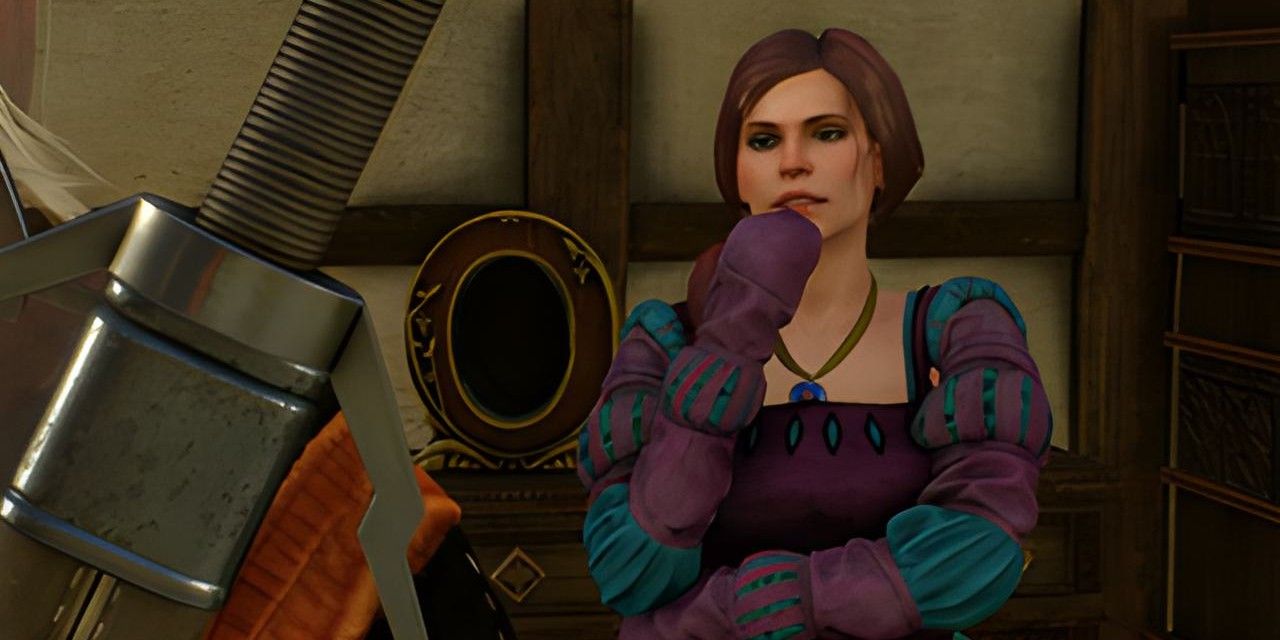
From there, Geralt has to help get the play’s production in motion by delivering the script to Irina Renarde. Irina agrees to help bring the production to life, but she sends Geralt on some more errands, like hiring ushers and recruiting the Puffins to advertise the show. Each section will force the player to run a few errands and check off a few boxes on various to-do checklists. Once these chores are taken care of, Geralt will help Irina choose cast members to bring Priscilla’s play to life.
After all of Geralt’s hard work getting the play together, he’s also cast to play the Witcher character. Players cannot get out of this decision, and they will have to make sure Geralt says his lines correctly throughout the performance. Like with Geralt’s other decisions, choosing the correct lines will help the performance be the best that it can be. Reciting some or all of the lines correctly will earn the player more experience points and crowns from the performance. If Geralt says every line correctly, he’ll also unlock a 10% discount for all Novigradian merchants.
“The Play’s The Thing” Is Controversial With Players
For Some, It Doesn’t Offer Enough Action
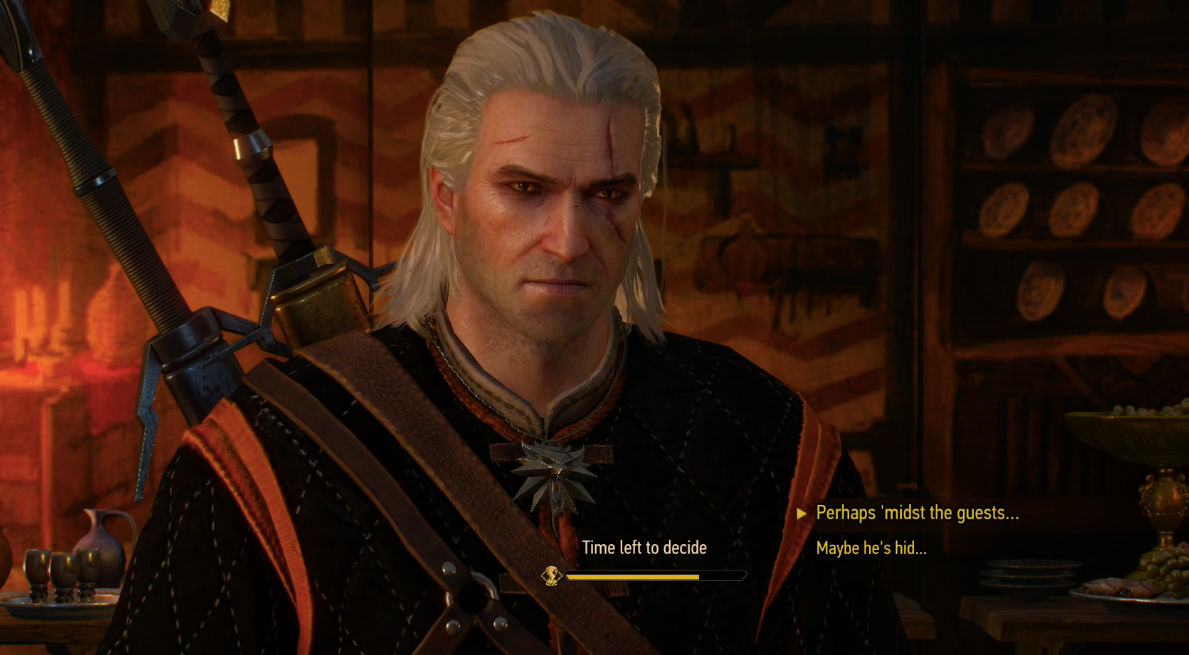
“The Play’s the Thing” turned out to be one of The Witcher 3: Wild Hunt’s most controversial main quests, but not for the reason many may expect. On a first playthrough, “The Play’s the Thing” quest can take well over an hour, especially having to navigate around Novigrad for all the various quest steps. Most of the quest is made up of cutscenes where the player has to make decisions for Geralt to put together the play’s production. It’s a lot of running around and talking.
For the most part, there isn’t much combat in the quest. There are a couple of quick segments where Geralt has to fight. He has to use force to get Fatso’s men to leave the Puffins alone. He also has to convince his desired ushers to take the job by fighting two of them at once. Both of these “battles” take seconds for a skilled Witcher such as Geralt, so many players don’t feel like they offer enough action. As a result, the lack of action makes this quest boring and hated in the fandom.
Many Players Wonder: Why Shakespeare Instead of Fighting?
After All, Geralt’s Calling Is To Slay Beasts

Since Wild Hunt is an action RPG, players expect most of their time will be dedicated to nonstop action. For much of the game, that’s true, but “The Play’s the Thing” is a chunky segment that forces players to slow down and engage in a plan that has nothing to do with combat. This quest provides a huge tonal shift that can’t be avoided. “The Play’s the Thing” (which takes its name from William Shakespeare’s Hamlet) is a main quest, meaning players have to finish it to complete the game. Most players complain about how much of a “slog” this mission is to get through, because they would have rather been in the thick of a heated battle.
“To slay beasts most foul – ’twas for this I was made. I kill as my calling, not just to get paid.”
Despite the pushback this quest received, the tonal change is necessary. As mentioned, The Witcher 3: Wild Hunt is a long game. Most of the game is battle after battle, open-world exploration, and grinding XP. There are many high-stakes missions throughout the game. It’s designed to challenge players and push them to their limits at points. In the grand scheme of a 56-hour main campaign, one hour for “The Play’s the Thing” is a much-needed break from the intensity of the rest of the story. It gives players a rare moment of introspection to prepare for what comes next.
Another Important Message Hidden In Geralt’s Play
It Offers Insight Into That World’s Problematic View of Monsters

As mentioned, Geralt of Rivia is a Witcher who, to put it simply, is a monster slayer with heightened abilities, senses, and some magical potential in his arsenal. Geralt’s very existence suggests that the world he lives in is overrun with inhuman monsters that normal people need protection from. It’s not too great of a leap to assume that there is a serious issue with prejudice between humans and non-human creatures. In the Witcher universe, there are plenty of non-humans who aren’t actually monstrous and don’t deserve to be discriminated against or slaughtered. As Geralt says in the play:
“Sheathe your blades! Fear a doppler? ‘Tis a thing most foolish. Changing one’s shape does not make one ghoulish. Remember! ‘Tis not flesh a monster makes… But a heart that is base, such as in this knave aches!”
“The Play’s the Thing” makes fear and prejudice the main thematic focus of the quest. Dudu has gone into hiding and uses his power as a doppler to change shape every day to continue hiding. The quest mentions a few times that putting on a play about a Doppler is controversial and could potentially cause some issues. A riot breaks out if the play is presented as a serious drama. It has to be comedic and lighthearted for the audience to relax and enjoy the story without feeling threatened (which is another page out of Shakespeare’s book).
“The Play’s the Thing” Expresses Geralt’s Approach To His Calling
It Also Offers a Message To the Game’s Players
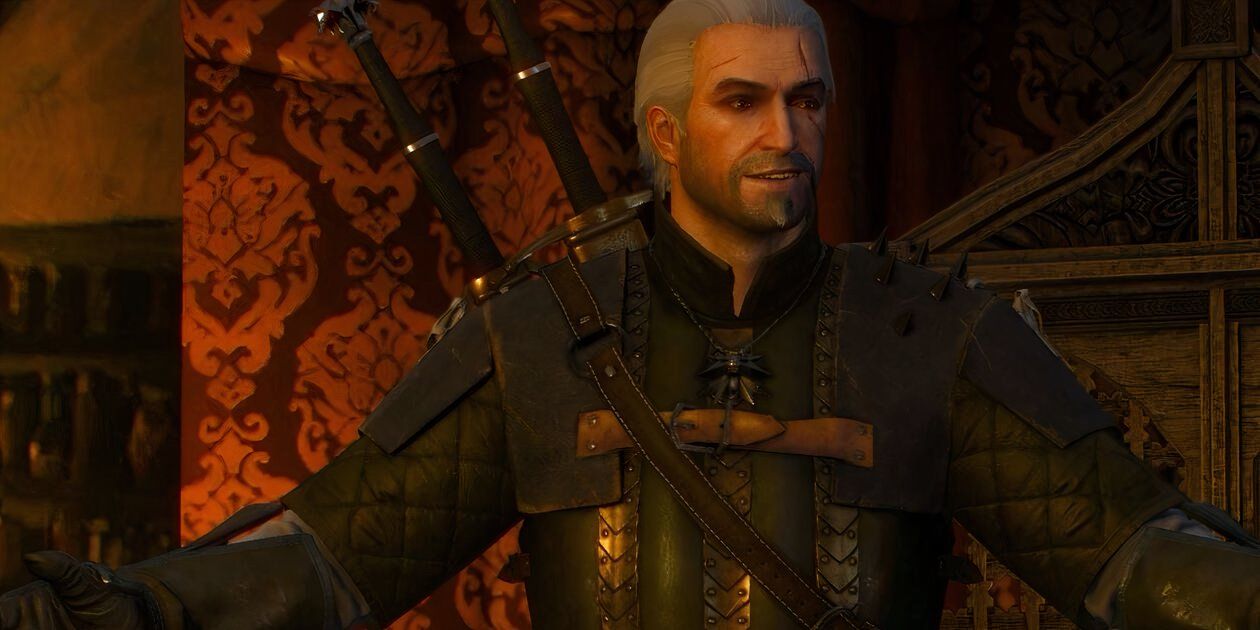
The play’s lighthearted and accepting tone allows a happily-ever-after narrative to end on a high note. It has a much deeper meaning, though. Geralt kills monsters, but he goes out of his way to correct people about what a monster actually is. Being non-human is not enough. Sometimes, the worst monsters are humans with evil in their hearts. It’s a being’s beliefs and actions that make them good or bad, not their species.
Naturally, this is designed to make Dudu, a doppler, feel safe enough to trust them, but it also speaks directly to the audience, both real and fictional. Geralt is taking an important and controversial stance that lets the play’s audience and the players know not to judge a book by its cover. Prejudice is never the right answer, even in a world overrun by monsters and beasts.


